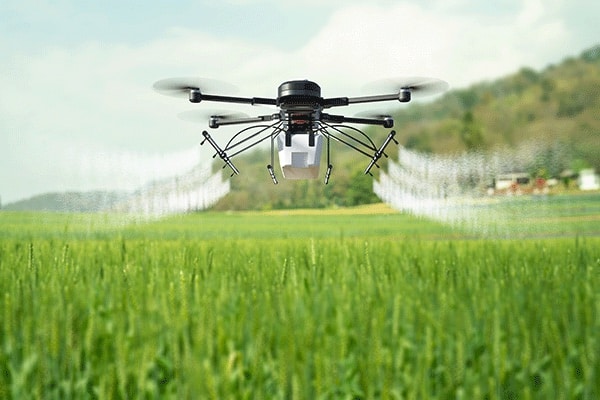Canine concerns from crop spraying

A renowned service dog trainer in Waterloo has had her life and business upended in the past few months as her dogs have encountered a myriad of health issues which she traces back to May, when a drone spraying chemicals on nearby crops caught her animals in its coverage.
Mary McNeight operates Service Dog Academy at 1632 Lakeview Drive, winning a number of awards through her years of work training dogs for service work with a focus on medical alert dogs serving folks with diabetes, seizures and a host of other medical issues.
As McNeight recalled, she started the business out of her own need for a medical service dog.
Her website boasts over 300 medical alert dogs that she’s helped train, and she prides herself in being a reputable business in an industry she said is rife with scammers.
Along with training service dogs herself, a key part of her business, as she explained, includes helping individuals train their own dogs.
As McNeight said, her work has stopped in its tracks following an alleged overspray incident with a drone spraying crops near her property.
She recalled the incident taking place the morning of May 5.
“We were outside playing fetch with the dogs, and I did not hear the drone whatsoever,” McNeight said. “By the time I saw it, it had already passed by the property line, and I didn’t know that we had been hit.
“The dogs got into a disagreement. They got into a little bit of a tussle. They’d never gone at each other before. As soon as I saw the drone, I was like, ‘Oh my god. This drone was spraying chemicals. Could we possibly have been exposed to them?’”
She emphasized how quiet the drone was compared to helicopters or planes she’s encountered spraying crops, that noise providing time to avoid contact with chemicals.
McNeight recalled rushing into the house and contacting the farmer who owns the property neighboring her home, sending him information on pesticide law and chastising him for not notifying her before the spraying.
She further recounted how her dogs continued to behave strangely, only to start having their eyes swell. They further began vomiting and suffering from diarrhea, seemingly having an initial reaction to contacts with the chemicals sprayed by the drone.
McNeight has since gotten a better idea of what was being sprayed – only being made aware of some of the chemicals quite recently.
These chemicals included the fungicide Prosaro Pro, the insecticide Grizzly Too and the supplemental chemical Spredde.
McNeight said she attempted to address the symptoms, washing the dogs’ eyes and taking them to the vet in order to get medication for their symptoms.
She also contacted Waterloo police, sharing with the Republic-Times the incident report dated May 9.
The report, written by officer Chad Harris, recounts McNeight’s overview of the incident and notes her four service dogs were “having problems with their eyes” afterward.
The report goes on to identify Scott Rohlfing as the farmer McNeight had contacted, adding he had hired Colin Kruse to spray his field.
Per the report, Kruse and Rohlfing noted the use of Prosaro Pro, with Kruse also providing flight records from the drone which indicate the drone “never gets close to Mary’s property while spraying.”
Also noted in the report, Kruse “advised that during the specific time and date of the job, there was a north-northwest wind at 5 MPH.”
While the police report does not indicate any apparent wrong-doing on the part of Rohlfing or Kruse, McNeight maintains her animals have suffered from various health issues in the wake of the incident.
Chief among these is her personal service dog Riva, who recently died of lymphoma that was originally diagnosed as pancreatitis.
McNeight recalled the fear and frustration she felt as Riva got worse in the weeks leading up to her death, not eating and having several other major changes in her behavior.
She also made note of Imogene, Riva’s mom and the mother of one of her other trained dogs. As McNeight said, Imogene has developed further eye problems which seem to be one of the more prominent symptoms for canine lymphoma.
She voiced the concern she’s felt in the wake of the incident and Riva’s cancer diagnosis.
“At this point, I’m really, incredibly concerned that every dog that was exposed will just go down and end up with cancer,” McNeight said.
She further noted the fear she has surrounding her business as, with her positive reputation, she finds herself unable to sell her animals given the possible health issues they might have.
“I cannot sell any of these dogs to my students,” McNeight said. “My students are losing their opportunity to train their own dogs. I have students all over the United States and Canada, and I have students who actually need a dog right now, and I can’t provide them this.”
With considerable veterinary bills, McNeight remains concerned about her other dogs’ health and their ability to breed, suggesting she might have lost an entire line of service dogs.
Further, she expressed concerns about her own health as she has seemingly developed hearing loss, blood pressure issues and an intolerance to wheat products.
While a direct link between the apparent exposure to crop chemicals and the health issues suffered by McNeight and her dogs hasn’t been established, she emphasized that exposure to such chemicals is a concern which needs to be discussed in a rural community.
“I realize this is a farming town, and this is a very hard topic to talk about, but it needs to be talked about,” McNeight said.






